|
Taken from Los Angeles Post-Examiner (Jul 09, 2021)
Tony Levin Talks About King Crimson and His Musical Journey
by Tim Forkes
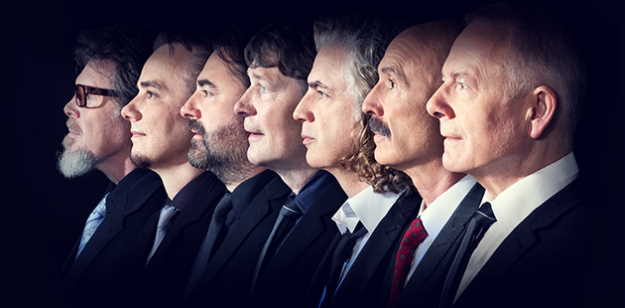
Top photo provided by dgmlive.com |
King Crimson fans - old King Crimson fans - might remember where they were when they first listened to the band's debut album, In the Court of the Crimson King. Because of age we sometimes forget the details and because we were probably stoned when we heard it ... Anyway, we may or may not remember where we were when we first heard that album.
For me it was a friend's house, while his parents were at work and we could smoke pot with abandon. And as I recall we were listening to the album because the local underground rock station, WTOS in Wauwatosa, Wisconsin (the burbs of Milwaukee), was playing the hit song from the album, "21st Century Schizoid Man".
"Cat's foot iron claw
Neuro-surgeons scream for more
At paranoia's poison door.
Twenty first century schizoid man.
Blood rack barbed wire
Politicians' funeral pyre
Innocents raped with napalm fire
Twenty first century schizoid man.
Death seed blind man's greed
Poets' starving children bleed
Nothing he's got he really needs
Twenty first century schizoid man".
WHOA!
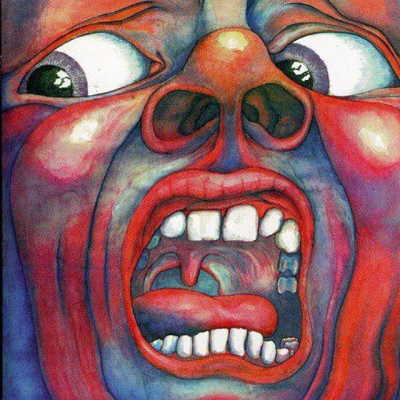
In the Court of the Crimson King cover (Island Records) |
You didn't need to be stoned to figure out this was extremely different, that it was ground-breaking rock music. It changed the way many of us approached listening to, or playing, music. Hell, the album cover was freaky in its own right.
There it was. Jimi Hendrix was out there for sure, on a different plane, miles ahead of most of his contemporaries, including Pink Floyd, the ultimate 1960s psychedelic band. Jimi Hendrix was, unquestionably, a ground-breaking performer. But King Crimson was (and is) in a different universe, a different dimension. In the Court of the Crimson King ushered in a new type of rock music which eventually became known as Progressive Rock. Well, not the best genre name out there.
Through the 1970s we were treated to a great swell of Prog Rock, from Emerson, Lake and Palmer to Yes, Jethro Tull, Genesis and more. Those were the very popular ones. And just to be clear, as King Crimson was preparing and recording their debut album, many of these other bands were preparing and recording their first albums. Yes, for instance, released their debut in July 1969. Although it wasn't strictly progressive rock, it was the beginning. Keith Emerson had been recording and touring with the band Nice, a powerful precursor to what would become prog rock. But In the Court of the Crimson King broke new ground.
Greg Lake left King Crimson to form the group with Keith Emerson and Carl Palmer, but Bill Bruford left Yes to join King Crimson. Had he stayed with Yes Bruford could have been a part of one of the first and top arena rock acts of the day, but Crimson was more to his creative liking.
After that break out album King Crimson followed with In the Wake of Poseidon, Lizard and Islands, all three between 1970-71. Then, in 1973 came Larks' Tongues in Aspic, followed in 1974 by Starless and Bible Black and the epic Red. These last three blew our minds as much as the first album.
Then the band was no more. Fripp was doing projects with everyone and anyone, progressive rock or not. Brian Eno, David Bowie, Blondie, Talking Heads and Peter Gabriel in particular. That's not actually the complete list.
But it was during the sessions for Gabriel's first solo album in 1976 when Fripp met bassist and (Chapman) Stick Man Tony Levin. The two toured with Gabriel and eventually found themselves creating music with longtime Crimson percussionist Bill Bruford and Avant Garde guitarist/singer/songwriter Adrian Belew. This became one of the most successful iterations of the band. While recording their first album the band called themselves Discipline, but after a short tour they went back to King Crimson and called the first album Discipline. Once again the Crimson created a ground-breaking record, one that changed the way many of us thought about music. With uncompromising complexity, Discipline introduced many King Crimson fans to new ideas like minimalism, a foreign concept in progressive rock. But it wasn't just a "less is more" approach. The band used a gamelan style of polymorphic rhythms interwoven into each other by extremely intricate parts.
This not only required the musicians to be very meticulous and focused on every note and beat of every song, it required the listener to do the same. It's not unusual for listeners to perk up and ask, "How'd they do that?"
In 1981 King Crimson was the most Avant Gard, advanced musical group on the planet. And this was at a time when John Cage and Philip Glass were touring with their compositions.
It was at this starting point I had the chance to sit down with Stick Man Tony Levin, via Zoom, to talk about the band, the music and what life's been up to since 1976. During the pandemic lock downs for instance Levin curated and published another book of his photos from his life on the road. Now, King Crimson is back, in a seven-piece group, playing music from every era of the Crimson.
First off, Tony Levin is easily one of the most interesting, well read and well informed people in music. It would not be a surprise if he could talk about topics outside of music, but we didn't get into any of that. There's more than enough to talk about when it comes to his career and traveling with King Crimson.
Starting it off I asked him about playing on that old ABC sketch comedy show Fridays (April 10, 1981). Many people had only heard the album, or maybe the odd song they played on that show, "Elephant Talk", so seeing it was just four people - three very notable people and a guy playing a weird looking stringed stick - was a wonderful surprise. Maybe some people tuned into the show because of the comedy, Larry David, Elaine Paul, Michael Richards and Rich Hill, among others, or maybe they tuned in because Peter Fonda was the guest host. The skit about a biker club getting excited to have Fonda visit them, hoping he was like his character in Easy Rider was gold. Then there were the musically adventurous who may do indeed enjoy comedy and loved Fonda's movie, but were watching because King Crimson was the musical guest.
Tony Levin laughed when I asked him about it. He said, "I remember that. What were we doing on that show? We're not a pop band. We didn't even know why they had us on, but they did".
Well, like the show itself, King Crimson already had a devoted cult following and it would most certainly tune in.
One of the most fascinating aspects of Levin is that he plays the Chapman Stick. There are no more prominent players of the Stick than Tony, so I had to ask him about it. In previous interviews he's spoken about it, so I asked him how he got acquainted with it in 1976.
"I heard about, I think, in '75 when it came out because I used to play bass with that same tapping, hammer-on technique. Not often, but sometimes. So a bunch of players I work with told me, 'Hey there's this instrument that's made to be played that way you're playing the bass. You should check it out.'
"So when I was next on tour and in Los Angeles I did check it out and got one. I know the year was '76 because I brought it to Peter Gabriel's first solo album after he left Genesis, which was in July of '76. The producer took one look at the instrument - I opened it up, I could hardly play it - I opened it up and [producer Bob Ezrin said] 'Put that thing away. I don't even want to see it!' So I didn't play it on that album, but from then on I had it on tour with Peter [Gabriel}, and especially I played it with King Crimson and many years later when I was working with that same producer, Bob Ezrin, with Pink Floyd. He asked 'Hey can you play the Stick on this track?' So I was gratified he went full circle".
At that first Peter Gabriel album session Levin would meet the legendary guitarist and King Crimson founder, Robert Fripp and both would go on tour with Gabriel to support the album. I asked him about that meeting, with two legendary progressive rock performers. "Robert [Fripp] did that first tour with Peter Gabriel One, we called that album, Robert was on tour with him - although he didn't let Peter introduce him as Robert - he had to say 'Dusty Roads on guitar.' Robert was off in the wings where the audience could hardly see him. But he was playing on that tour".
Tony said he and Fripp sort of stayed in touch, while Levin became better acquainted with the Chapman Stick. He said, "We somewhat kept in touch, but when he did his solo album, I'm not sure what year, but after '76, called Exposure he asked me to play on that. Wonderful album, which was essentially King Crimson-like material that he had written, but was a solo album. So I guess he liked the way he responded to that and when he formed a new band in 1980-81 - which was not to be called King Crimson, we called it Discipline in the beginning - he asked if I would like to join that band.
"Frankly it was more like they were trying me out; I was checking them out, and it worked out, obviously. On those days I met Adrian Below and Bill Bruford, the other players in that band who were to influence my playing and my musicality a great deal in the subsequent years, so that was great.
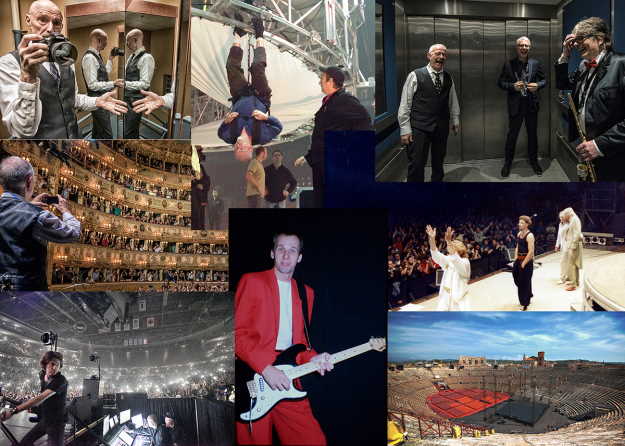
Photos by Tony Levin |
"We toured for a very short time as Discipline and once we had the record together we changed the name to King Crimson and used the album as King Crimson.
"I've been working with, and befriended and been a bandmate with both Robert and Peter Gabriel ever since '76. When I think about it that way it was quite a day in my life. It was pretty fortuitous that I met then both in one day. Glad I showed up".
Indeed. The music that has come from just those two acts, since 1976, is a hefty discography. You can check Gabriel's catalogue here. But right now Tony Levin is gearing up to tour with King Crimson, that seven piece combo that will probably blow your mind as much as that four piece we came to love in 1981. Or, maybe you were in love with the group(s) the created In the Court of the Crimson King, In the Wake of Poseidon, Lizard and Islands, both of which I consider exceptional albums. Or maybe you like the era with Larks' Tongues in Aspic, Starless and Bible Black and the heaviest album in history, Red. Well, the song "Red" is considered the heaviest rock song ever.
"Heavier than 'Kashmir?' Yes Virginia, heavier than "Kashmir".
We can compare the two here if you like, "Kashmir" and "Red", (Don't you love YouTube?) "Kashmir" is a great song BTW.
Back in the day, when the 1080s four-piece was touring we would often hear them do "Red" and it was always a great concert piece.
Tony Levin joined the King Crimson family with the ground-breaking album Discipline. At the time there was a minimalism movement in art, including music. Fripp was deep into it in his collaborations with Brian Eno, among others. Although some artists took minimal to mean simple, that wasn't the case with the Crimson.
The sense of minimalism is evident with Discipline (followed by Beat and Three of a Perfect Pair), but in a very dense, and technically precise way. As Levin explained, this type of very precise music doesn't have any wiggle room for errors. When I asked him to compare the current seven-piece band to the 1980s group, he was quite clear about the major similarity. He said, "Being that it's a very different band. It's King Crimson, we call it King Crimson. We're playing similar material, some of it, but three drummers alone changes everything. That changes the whole paradigm. I love that we have them in the front of the stage so the audience is seeing them, as they should, as the main part of the show to watch what the three drummers are doing. The other four of us are on risers behind them".
Then that consequential similarity, "I haven't really compared them. The way that they're similar (1980s vs current) is it's very challenging musically for us. It requires a whole lot of concentration, it requires being at the top of your game instrumentally and really being on top of what you can do to be able to play the material. Not that it's blazingly fast, but it's very complex, because of the intertwining time signatures it's really important to not make any little mistakes, especially in some sections. I'll put it a different way: There are some sections in this show when if one guy makes a mistake it almost requires the band to stop and start again. It's so complicated nobody can go 'One-two-three-four' and bring us back together. We're thinking in different time signatures. So that kind of concentration for a three-hour show, which is what we were doing in 2019 is a good challenge and is very good for me musically and mentally. And it's actually fatiguing in a funny way, considering we're just standing still, we don't jump around. At the end of the show I know I'm pretty tired. I think most of the guys are, just from concentrating and trying to do it right".
Did Tony levin and the band think of that Discipline album as ground-breaking? Levin said no. He explained, "Can't speak for the other guys, but pretty much we were doing what you do when you're musicians. We were making music. You take it for granted you're trying to make it as good as you can. For my part I was being influenced very quickly and deeply by the other players".
When we think of the other three players, Robert Fripp, Bill Bruford and Adrian Belew, they had incredible experience in the 70s. Levin continued, "If you think about their history the [other] three guys in the band had played a lot of progressive rock, wonderful, unique players. I'm not saying I didn't have my own style, but I was less immersed in that genre than them and I was picking up the unstated rules and I was trying to break away from what I had done before and do things differently because that is what I musically heard the other guys do. Even though what they did already was very distinctive and unusual and very special. I picked up that we were just trying to do something that hadn't been done. But we didn't put it that way, we didn't say, 'Let's do something ground-breaking.'" Maybe not, but Levin added, "Robert and Adrian created music and Bill Bruford, in his very Bill Bruford way, reacted to that in a way that no other drummer on the planet would. And he played maybe a counter piece or something completely in a different time signature. And he would say, 'Hey Tony, why don't you join me. Those guys will play in five and we'll play in eleven.'
I said 'Sure.' I gravitated towards the Chapman Stick which has a more unusual bass sound and percussiveness. I'm going to laugh because I'm still in the learning process, but I was in the early learning process of how to be a musical band member in a band where everybody's got a unique sound and doing something that you never heard before".
In a very Tony Levin way, Levin just described a band trying to make a ground-breaking album.
Listening to the three studio albums put out by that four-piece line up we can hear the precision required to perform the music, including the vocals. Sure, they can perform "Elephant Talk" live, but what about "Discipline" or "Frame by Frame" or "The Sheltering Sky"? Well yeah, they performed - and maybe still perform - all of them live.
As a listener, either in the comfort of your recliner or in a concert venue, one needs to concentrate on the music, to hear all the nuance, all the complexity - to experience ever note and beat - of the music by King Crimson, regardless of the album or era. It is challenging music for the players and audience.
I asked Levin if they had music, either hard copy or on tablets and he replied, "Some of us use music, by which I mean written out charts on a music stand and some don't. For myself I need music on about three or four songs so I have the music stand. I don't need to read the whole piece. We have a series of pieces called the 'Radical Action Part 1' (through five) but part four is part one and part three reversed. Very complicated. They all have similar themes so as you can imagine when I see on the set list 'Radical Action, Part 2' I have to look at a chart. I could really, maybe I should, devote a lot of time getting it straight in my head, memorizing which is which, but it's easier just having a few notes [and say] 'This is the one that starts in G and the figure beats twice as opposed to the other one that starts in G and the figure moves on after one beat.
"I'm not sure but I think Jakko (Michael "Jakko" Jakszyk) has the lyrics on a music stand just in case he needs them, but I've watched him night after night and very rarely does he look at that music stand".
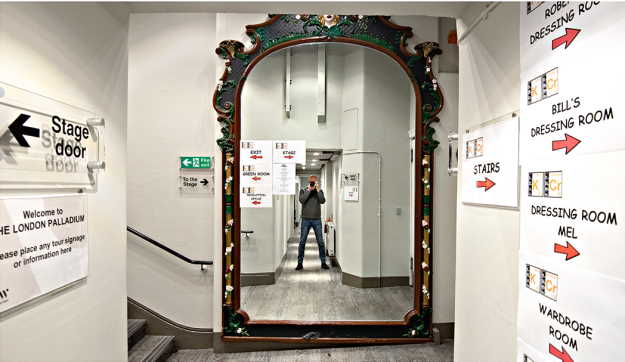
Images From a Life on the Road. (Photo: Tony Levin) |
Levin had a lot to say about his band and his touring. Like what was mentioned earlier he just published another book of tour photos that we can purchase. I had asked him if he was still taking pictures as he and the acts her performed with traveled the world. We had been talking about a show that was supposed to take place at Poplar Creek Music Theater in 1982 but was canceled due to a thunder storm that flooded the place and knocked out the power. Levin had a picture of Bruford sitting in the empty seats as water rushed down the aisles. He said, "This year I had a very gratifying release of a photo album of all my pictures - sorry - pictures from all my tours, not all my pictures. That means tens of thousands. But I picked the best ones and for many years I have been wanting to make a coffee table book of large versions of them and I'm very happy with that and I'm very happy it gave me a very deep and hard job to do during the lock down year. I really worked on it daily from June until December. It's called Images From a Life on the Road and I'm very proud of it. And more than that I'm gratified to have those pictures out in the public where people can see them and share them because some of them are special if only because of the vantage point I had from stage, like you said, at Poplar Creek, but also, for instance, in the 70s when Peter Gabriel started floating out in the audience and there I was on stage taking pictures of what later would be called crowd surfing".
What happened? I remember once, being somewhat buzzed at a Peter Gabriel concert and having my friend nudge me and say, "Hey it's Peter Gabriel!" And there was Gabriel floating above the row in front of us. As Tommy Chong would say, "That's some good shit".
Levin continued, "At the time there was no such term (as crowd surfing). Kind of historic in a small way, especially of value to the fans. So it was a great, gratifying experience to finish that book and have it out there.
"Let me tell you having taken hundreds of pictures of that event, especially in the early years - the early part of that tour when it was a surprise - the looks on peoples' faces is what makes it so special. And Peter is just trying to hold himself physically together with all the prodding and things that go on. But the audience, they can't believe it! They can't believe what's literally in their hands. It's the artist they came to see. Very, very special.
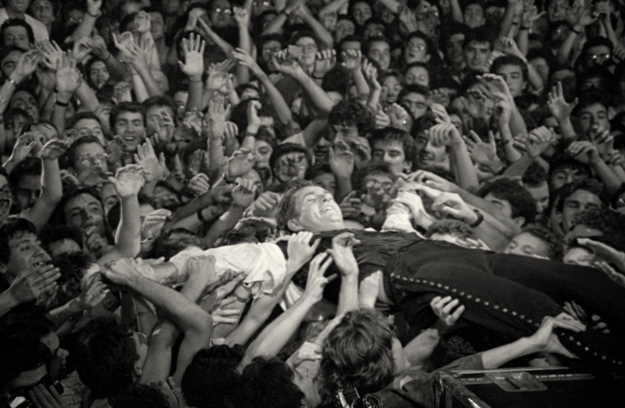
Peter Gabriel crowd surfing during "Lay Your Hands". (Photo: Tony Levin) |
"An interesting phenomenon that I couldn't capture in the pictures; depending on the aggressiveness of the audience they would either send him right back to the stage - and keep in mind it's a crowd decision. No single person can decide anything about that, you're just floating on their hands - they would either send him right back, or if it's a very aggressive audience they would take him way to the back of the venue and then send him back. We would be on stage vamping, and I would be taking pictures, singing 'Lay Your Hand on Me' for a long time, many minutes, hoping they (the audience) would bring him back. They always brought him right back to the front of the stage where the crew could carry him up on stage. By that time some of his clothes were gone, sometimes almost all of his clothes, but he was unharmed and it's really an amazing phenomenon about the audience with their group-think like that. Nobody could control it, but they (the audience) always took him to the degree they felt comfortable and they sent him back. Some places didn't feel comfortable taking him hardly at all and they sent him right back".
Which brought to mind this question. Fans of bands like King Crimson and Peter Gabriel are very respectful towards the bands on stage. Not surprisingly, Levin notices it too. "Audiences are all different. In the acts that I play with of course there's always a lot of respect for the acts and I'm very pleased to see that.
"I'm aware of two things: How the audience sacrificed something and gone through something to be there. They're just not automatically there. They spent money, they spent time, sometimes traffic - horrible effort just to be there and share the music so I try to always have that in mind.
"And also, the magic ... I love live playing and sharing music with audiences. I like recording a lot too, but playing live, this thing we haven't had for the last year, is very precious to me. It's my life's work and I'm very aware of the magic that happens on the night is not just because of the band. I know that for a fact because with shows every night just about, for over half my life, some shows stand out as very precious and very special. None of us knows why, but it's to do with the venue and very much with the audience and what the audience gives to the band that we don't stop to analyze, but the magic of the night is a product of the audience plus the band. So I try to keep that in mind every night. I don't say anything about it, but I'm very grateful for the audience showing up, especially for challenging music, which Peter Gabriel is to some extent and my band Stickmen and King Crimson for sure".
For those of us wondering what to do without our favorite bands not touring during the pandemic, Robert Fripp and his wife Toyah Wilcox started performing the "Sunday Lunch" video series on YouTube. They do short versions of popular songs we hear on radio, from Led Zeppelin to the Eurythmics, Heart to Metallica and more.
That was a revelation to many King Crimson fans that may have pictured Fripp as a very serious person. The man has a sense of humor!
Likewise with Peter Gabriel. If you watched any videos of him handing out awards or speaking to an audience, it is apparent he too loves to smile and laugh.
So I asked Tony about them and having a sense of humor, especially when touring and recording, "Yes it's very important and well put. I think the world knows now what I knew is that Robert Fripp has a very good sense of humor. The fans kind of thought of him as this stern guy because that was his musical persona in shows, and maybe still will be, I don't know. Of course we saw the side of him that's very funny.
"I'd say that any band that's together a lot on the road, how it gets along, how we feel about each other is very important. It becomes more important even than the music. It's a family, I'll put it that way. And if it's a dysfunctional family you're going to be unhappy on the road and it's going to be a negative experience and that's going to lead to even more trouble on the road and of course the band breaking up. If it's a positive experience it's that much better.
"With Peter Gabriel he's the way he seems to be, he's that great a guy. He's a great person, a kind of family guy so one feels like he's in his family as soon as you join the band. And even the crew, as soon as you're on the tour. So it's always welcoming, a lot of fun, a lot of joking during the show.
"King Crimson, a much bigger band. The guys are very funny, like comedians. We're deadly serious during the show, and before it and a little after it. But then the jokes start up and we have a lot of fun on the road - thank goodness. If we spend all day being that serious it would not be gratifying".
Fans will be very gratified when King Crimson tours, after that long lock down year. For those who have been going to Crimson concerts for decades as well as the uninitiated, a King Crimson concert is an experience. It's music that challenges your mind and soul. Seven serious musicians who, in their off time, are apparently comedians.
Instead of cherry picking a couple sentences from each of Tony's comments, I used entire answers, or at least the most relevant sections of his comments to get the context of what he had to say. Tony Levin is a very interesting guy and to misquote him or give the wrong impression to his words would be terrible. So this article is necessarily long. And still there is much of our conversation that didn't make it to this page. So there is a second page with the entire interview for the readers that care to learn more about the man, his Stick and his bands. He spoke about Stick Men, which Tony Levin fans will find quite interesting. Oh, and the topic of origin stories about musicians.
King Crimson will have two shows in California: August 5 at the Concord Pavilion in Concord and then at the Greek in Los Angeles August 6. My old home town of Milwaukee, WI can see King Crimson August 31 at the Miller High Life Theatre and our readers in the Baltimore, MD area can experience Crimson September 11 at The Anthem in Washington, D.C.
The current line up of King Crimson includes Tony Levin, Robert Fripp, Jakko Jakszyk, Mel Collins, Gavin Harrison, Pat Mastelotto and Jeremy Stacey. You can read more about the band at dgmlive.com
|